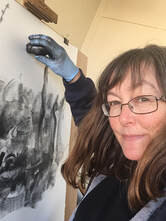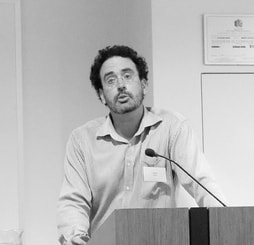|
by Becky Holland  Fiona left school in year 11 and did a variety of jobs. In 1985 to 1990 she attended the Julian Ashton Art School in Sydney. Founded in 1890, it is the oldest continuous fine art school in Australia and is still operating today in assisting artists achieve their dreams. Over the years, Fiona has thought of herself mostly as a visual artist doing black and white pen drawings, but also gouache colour pictures. Most recently, Fiona took an opportunity to be part of Stuff of Tales. Each writer or artist is paired up with a museum in the New England area and conducts workshops. Fiona had the chance to explore Saumarez Homestead with the view to select an item from the collection to become the basis of a story. By Becky Holland  How do you begin a poem? For me, a poem begins with an inspired, though fleeting, thought or impression that I realize I must write down promptly, or risk losing. I tend to begin poems outside, in contact with the earth—with a notebook, leaning against a tree or smelling a plant—but I usually finish poems indoors, in insulated comfort, and occasionally a long while after I initiated them. I’m fascinated by language, and particularly by archaic and scientific terminology, so poems can be prompted by odd words. On a much different note, a poem sometimes begins with a broiling sense of indignation that I feel I should set free. |
AuthorThe NEWC Board Archives
March 2024
Categories
All
|
- Home
- Writing for the Primary Education Market
- Story to Script Course
- Writing and Illustrating for Children
- Thunderbolt Prize for Crime Writing
- Illustration Prize for Children's Picture Book Publishing
- Varuna-NEWC Fellowship
- Grow Big Little Seed
- Crafting Memoir
- About
- Membership
- Contact Us
- 2023 Archive
-
2022 Archive
- 2021 Archive
- 2020 Archive
- Blog
- Resources
New England Writers' Centre
|
We gratefully acknowledge the support of Create NSW and our other generous sponsors
|
We acknowledge the Traditional Custodians of the lands on which the New England Writers' Centre is situated and pay our respects to Aboriginal Elders past, present and emerging.
